Rhonda Ranch: Evolution of a Dream into Innovation, Inspiration and Opportunity
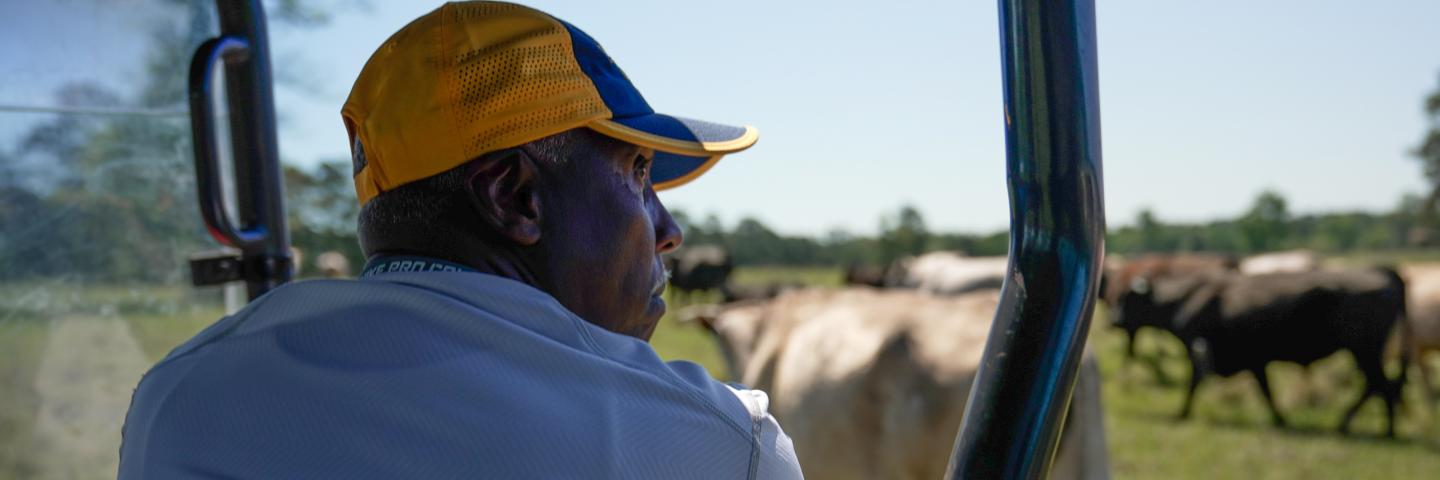
Fred and Rhonda Newhouse own and manage a 900-acre crossbreed cattle ranch in New Waverly, Texas. Working with Texas NRCS, they have installed many conservation practices including cross fencing, grass planting, watering facilities and clover establishment utilizing EQIP and CSP.
ArcGIS Storymap, Article and Photos compiled by Adele Swearingen, Public Affairs Specialist, Bryan, Texas
Rhonda Ranch: Evolution of a Dream into Innovation, Inspiration, and Opportunity ArcGIS Storymap
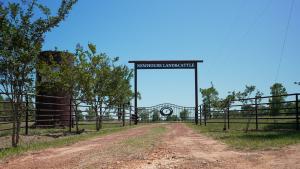
Fred and Rhonda Newhouse own and have managed a 900-acre crossbreed cattle ranch in New Waverly just outside of Houston since 2007. The operation is named after Rhonda, a loving gesture from Fred to his wife in honor of their 50th wedding anniversary.
“I thought it was only appropriate that we named this ranch for Rhonda because she’s the love of my life, my best friend, the mother of my children,” says Fred. “She’s just simply the best.”
Similar to the energy the two high school sweethearts emit that draws people to the devoted couple, Rhonda Ranch is more than just a ranch to those who work it and visit it. It’s obvious everyone benefits from the Newhouse’s kindness and generosity.
“It is an honor and pleasure to be one of the owners of a ranch,” says Rhonda who describes the experience as being educational and enlightening. Rhonda grew up in the city and says it was Fred who first introduced her to what she’d come to know as the country life and farming, which she describes as being very rewarding. She recalls Fred talking about his dream of wanting to own a ranch as far back as high school.
“I was delighted to help him fulfill that dream.”
Humble Beginnings and Big Dreams
Fred grew up in Hallsville, Texas, which had a population of 685 people. As a young boy, he’d dreamed of one day owning a ranch like the one his bus passed by every day on his way to school. After high school, Fred went on to study electrical engineering at Prairie View A&M University.
Life happened and after two Olympic medals, a beautiful marriage to Rhonda, and 20 years in the oil industry, Fred says he started looking for land to buy. He found a ranch in east Texas on his grandparents’ farm, but according to Fred, after they passed, it just wasn’t the same. He still loved ranching, though, and looked toward the Houston area where he found what would eventually become Rhonda Ranch in 2006.
Rhonda was raised in the City of Marshall and went on to attend Prairie View A&M University as well, but her path took her into the field of education. A now retired educator of 34 years in the public school system, Rhonda went from teacher all the way to principal during her tenure.
“During that time, you develop a love of working with people and working with students especially. You want to do everything possible to help them in their education as well,” she says.
Today, she serves as President of the Spring ISD School District Board of Trustees. The position has been very rewarding, giving her the opportunity to share Rhonda Ranch with students from Spring ISD.
Rhonda shares that it’s rewarding to see students who have never been out of the city come to the ranch and have an opportunity to be around cows, ride the tractor, take hayrides, and even ride a four-wheeler.
“It’s so exciting to see the expressions on their faces when they come out here,” says Rhonda. “And then they go back, and they tell the other students out there, and then I have someone else calling me asking ‘Can we come out to Rhonda ranch?’”
“Rhonda Ranch has been very rewarding for me and being able to give that to students and my community.”
Community-Minded on the Ranch and Beyond
Beyond Rhonda’s students, the couple is incredibly active within their community and with their church.
Fred sums up the reason behind their community-mindedness this way, “We do a lot of things. In fact, we see an opportunity every day. The question is ‘Do we take that opportunity?’ I’m not unique in that respect,” says Fred.
“I think everybody has an opportunity every day to make a difference in somebody else’s life. It may be nothing but giving them a nice smile or a pat on the back or a word of encouragement or giving some of your time.”
Fred says they open their ranch to various groups like the Girl and Boy scouts, bringing them out to the ranch to learn about ranching and other useful skills.
A few years ago, people in their church community came together and reached out to Fred to form an organization called the 100 Ranchers. This allowed like-minded folks to get together, collaborate, and share ideas.
“We’d have speakers from agencies like the Natural Resources Conervation Service (NRCS), Farm Service Agency (FSA), and all the [agriculture] agencies come out and speak to us about things that are available to us to help us improve our practices our products. In the process, we would share ideas about things that we were doing. We’ve been doing that for 9 or 10 years now. It’s been a wonderful experience and it continues to grow.”
Through that experience, they found themselves involved with Prairie View A&M University, who’d given seminars where they learned even more technical things. And through that activity, they met Horace Hodge, a Liaison Manager for USDA. Hodge reached out to the 100 Ranchers organization to see if they could assist with the Farmers to Families program. The Farmers to Families program is an assistance program that gets fresh produce to families in need.
“I raised my hand immediately because I can see – I don’t have to go far to see people that need help. That need help daily,” recalls Fred.
As a result, throughout the COVID-19 pandemic, and with the added help of Dr. John D. Andrews, pastor of First Baptist Church in New Waverly, they managed to feed hundreds of families in rural communities' multiple times a month, by delivering fresh produce, meat, milk, and bread, about once a week. The entire program is a volunteer-only program, 501(c)(3).
“Last summer, I met Horace Hodge and Fred Newhouse and we were involved in Farmers to Families, and we started the program there and were able to
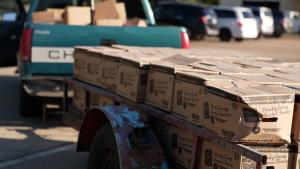
help a lot of folks,” says Dr. Andrews, pointing out that they added another 46 other churches and organizations. “We serviced seven different counties with the food that we distributed from First Baptist Church. Since then, we have distributed about 60,000 boxes.”
Dr. Andrews describes Fred as someone who is purpose-driven and who does an excellent job in whatever he does. “Learning his life story of what he’s done in the past, this has been something that’s been a great, great help here in rural Texas,” he says of Fred’s unwavering commitment to the program.
I thought that I was just meant to make a difference in the lives of the people right here around this ranch,” says Fred. “Wrong. Very wrong. This program gave me an opportunity to make a difference in the lives of people in the seven counties surrounding New Waverly, and I am so happy that the opportunity came my way.”
Medalist to Manager
Purpose driven is certainly one way to describe Fred, whether he’s out in the fields of Rhonda Ranch thinking of ways to make the operation more sustainable, or on a track and field facing the finish line.
Fred was an Olympic medalist in the 1976 games, winning a Gold in the 4x400m and a silver in the 400m sprint. Since then, he has been active in the world of track and field, helping to judge and sponsor local meets, even establishing an all-women’s club team, The Northwest Flyers, with his wife, Rhonda, in 1995. The Northwest Flyers evolved into a men’s and women’s team and has since been the reason several athletes a year get scholarships to run in college.
Rhonda has watched Fred’s management style evolve over the years with the different experiences he’s had, although the foundation behind it was built many years ago.
“Fred has a style in which he can talk to anyone. I’m glad that happens because it has boiled over to [our] daughters, and they’ve been very fortunate for that.”
She recalls approaching Fred about starting a track team back when their daughters were very young. Of course, he said yes. This gave Rhonda a front row seat to see him coach, to manage the track team, and to manage the program.
“During that time, I had a chance to really see him coach, be a manager, work with parents and students, and work with mangers of other teams. I knew of him working with the U.S. Olympic committee, but I was never there to witness his success in what he was doing then,” she says.
“Our goals for our track team were simple and that’s to help other people to become successful. As a result, I’m very happy to say that each year we had a senior that graduated that got a scholarship that went on to run track somewhere for a major university. It was an honor to play a part in seeing that student be successful as a result of the track team,” says Rhonda. She says that winning on the track was only one part of their desire and vision for their students, the other being the opportunity to expose them to major universities and encouraging them to visit the universities and take in the sites at the various locations and cities.
On speaking of the team, which is still in existence today, she says, “The Northwest Flyers still carry that same desire, vision, and mission for their students and we’re happy to see that and see the growth of the team.” Unfortunately, the Newhouse’s had to hand off the team when they were required to move out of state for Fred’s work. However, now that they are back in Texas, they are happy to be involved with the team again.
These days, Rhonda is just as proud watching Fred at work managing the ranch in a way that’s not only been successful for their family but inspiring to others.
“His management of the ranch has given him the opportunity to be able to bring in others,” she says. “He goes to a beef management class at Texas A&M University every year. During that time, he gets the opportunity to meet other companies, organizations, and agricultural organizations and form a connection with them. He talks about Rhonda Ranch and of course always has an opportunity to invite them to come out to the ranch.”
Fred makes sure to keep himself educated and aware of what’s new in the industry to ensure Rhonda Ranch is moving in the right direction, according to Rhonda.
“He takes the time to go out and look for other workshops and for other things to do to educate himself so that he can bring that back to the ranch to use for management.”
Pursuing New Technologies
Longtime friend, Kenny Banks, has worked side-by-side with Fred for many years in different capacities. Kenny was a world class athlete in the high jump and met Fred through his career with USA Track & Field.
“We built a bond over the years and worked at the national level for USA Track & Field,” says Banks. Years later, when Fred had purchased the ranch, he turned to Kenny, aware of his farming roots. The two developed a close bond as Kenny evolved into a good labor provider, coming to the ranch to learn new farming techniques while Fred focused on the cattle.
At Fred’s urging, Kenny became involved in the cattle business as well and then later began flying drones on the property.
A part of maintaining the land is to promote the growth of the desired grasses without the interference of the undesirable grasses, like weeds. One way to maintain that is by spraying the undesirables.
“When you think about that on a place as large as ours, it takes a long time and that’s quite time-consuming and quite extensive. My friend, Kenny Banks, came up with this idea of utilizing a drone to spray. My reaction was. ‘Well, Kenny, your drone cannot carry that much water.’ We use a 500-gallon tank,” explains Fred. “He said, “Well let’s try.’ So, we talked to an agricultural resource service that we have in Bryant, Texas about how we can mix our chemicals to use less water. We put them on Kenny’s drone, and we started spraying using the drone to spray our ponds and to spray some of our hay matters.”
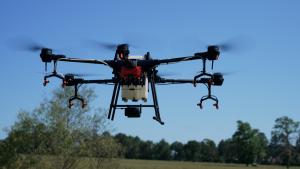
They found that what would normally take 8 hours to do, they can now accomplish in about 2 hours by using the drone. “We don’t worry as much about over spray. In fact, we get better, more uniform coverage using a drone. It’s less costly and it’s less harmful to the environment. So, it’s a win-win and it takes less labor,” says Fred.
Fred knows that this type of technology is something that could open even more doors for them, they just have to figure out what those are. “It’s unbelievable the things that come to mind every day that we do, that we could do better using this technology.”
Banks agrees.
“We search for innovative technologies and not using some of the antiquated things that were done on the old farm,” Banks says while describing the use of drones on Rhonda Ranch, “and we talk about different strategies. That’s kind of how we developed and got here.”
The natural growth around the pond can make it difficult for some cows or baby calves to get out or in some areas to get water, according to Banks. Where using a machine to manage the pond can be cumbersome, a drone allows for a more hands off experience. “With a drone, you can set it up, put the chemicals in, and fly it. You can get it out to the middle of the pond to treat those areas using less equipment, operating more efficiently, and you don’t have to worry about the water hazard.”
According to Banks, he and Fred are coming up with different ideas to utilize technology more frequently. One of those ideas is flying the fence lines.
“Farmers spend a lot of time driving a tractor along a fence line and spraying it,” says Banks. “We can spray 900 feet of fence lickety-split and use a less amount of chemical and have a higher amount of efficiency.”
Partnering with NRCS to Improve the Land
Before buying Rhonda Ranch, Fred had the opportunity to interact with NRCS in Harrison County near Longview–Marshall where he’d grown up. He’d reached out to get help in planting pine trees, advice on pasture development, and things like that.
“When we bought the place here, the first thing I did was invite a District Conservationist from NRCS here out to the ranch to talk to me about ways about how we may improve our activities and how NRCS may help us,” Fred says.
“He [the District Conservationist] made it very, very clear that they were not here to tell me what to do, but to complement me in providing advice and services on some of the things they might be able to do to help me achieve the objectives of this ranch,” he says. “Especially those things associated with conserving the natural resources of the ranch. So that fits perfectly with my objectives.”

According to Fred, NRCS came out and helped establish objectives for the ranch, helped him to understand the potential that the ranch has, and helped in designing how the ranch will function to conserve the resources and maximize its potential simultaneously.
Floyd Nauls has been a District Conservationist with NRCS for 26 years and started working with Fred and Rhonda shortly after they obtained the property.
“It’s been a tremendous honor to be able to work with them, getting conservation on the ground and getting things that had been discussed previously. It just takes time,” says Nauls.
Nauls says that he and Fred have implemented a variety of projects over the years on Rhonda Ranch, including cross fencing, grass planting, watering facilities (ponds), clovers establishment, and a number of other conservation practices. They’ve also worked on enhancements through the agency’s Environmental Quality Incentives Program (EQIP) and Conservation Stewardship Program (CSP).
“I consider him to be a friend, a mentor, and he’s just a great man to seek knowledge from. He is very open-minded. He is very giving, and he is very generous,” says Nauls.
“A lot of times we discuss things in conservation planning where we don’t see eye to eye, but at the end of the day, we’re friends. We’re both ranchers and we look at it from the perspective of getting conservation implemented through our program.”
For those worried about letting the government into their business, Fred says not to worry.
“Being an engineer myself, I know they didn’t just come up with these ideas out of the blue sky and say, ‘Let’s impose them on every American because we have the right to do it,’” Fred jokes. “It has a purpose and when we follow the design standards and take advantage of the research that our tax dollars paid for, then we reap the benefits.”
He points out that it’s not just about the financial support.
“Having that engineer – someone with the expertise and who may have made that mistake before and is now trying to improve the process, I’ve found that every time I’ve listened to their advice and took their advice,” says Fred. “Even if it’s been more extensive than what we’d normally done, it has paid dividends.”
“The system works, the process works, it’s good for the environment. And it’s good for the people,” he says.
Dreams from the Past While Looking Toward the Future
“This ranch is just simply the best for me. It’s a lifelong dream,” says Fred.
A dream that didn’t come to be without a lot of vision, hard work, and dedication.
As a result, Fred and Rhonda have created a thriving environment both on and off the ranch in so many ways due to their never-ending energy and
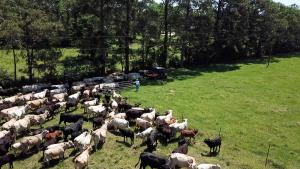
willingness to learn, grow, and share with others in the community who also have vision and are willing to work toward it.
Beyond the cattle for whom he cares, Fred points to a grove of pecan trees on the ranch, in which, he says a couple of trees died and failed. Instead of removing them, he chose to leave them where they were.
“I’m sure that there are skunks, rabbits, raccoons, all kinds of stuff in those woods and we want to keep them there. We want them to be there. We want them to be natural. Normal,” he says. “Hey, it’s a great habitat for wildlife and we want to preserve it.”
Fred believes that his life journey—from a boy with a dream, to winning gold and silver Olympic medals, to finding and loving Rhonda, and then to discovering and cultivating Rhonda Ranch, demonstrates that when people have dreams and objectives, small or large, anything is possible so long as you don’t give up.
“If you really want to do something then you can,” he says. “This is one of God’s blessings on me. He’s been extremely good to me and I’m forever in his debt.”

